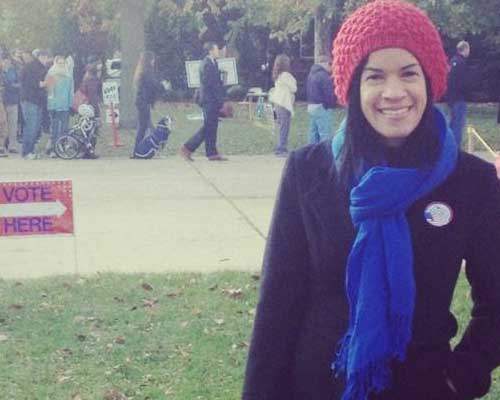 Much attention is being paid today to the political horse race, the polls, and the impending conclusion of the 2012 presidential race. But Election Day, at its most basic roots, is about the voters—and one of the very first voters this morning in Alexandria, Virginia, was our own Ana Betances, the newest member of America’s Voice and a native of the Dominican Republic.
Much attention is being paid today to the political horse race, the polls, and the impending conclusion of the 2012 presidential race. But Election Day, at its most basic roots, is about the voters—and one of the very first voters this morning in Alexandria, Virginia, was our own Ana Betances, the newest member of America’s Voice and a native of the Dominican Republic.
Ana woke up at 6 AM today and braved an hour-long line in the freezing morning to make sure she had time to vote before coming to work. Her mother, back in the Dominican Republic, had woken up even earlier, texting Ana to see if she was excited to vote. It was an important moment for the entire extended family, watching the only US citizen among them vote for the very first time.
For Ana, voting has always been a duty and a responsibility–even when she lived in the Dominican Republic, where voting is rife with fraud. As Ana described voting there, “It’s sad when you see that you voted and it doesn’t count. The person who wins is the person who spends the most money. The Party will give people food and money to vote, and people will sell their ballots.”
“It’s getting worse,” she continued. “It’s depressing.” And the long lines that have plagued swing states like Ohio and Florida this year are a regularity in the Dominican Republic, where voting is very disorganized and you “basically have to spend the whole day” waiting for your turn to cast a ballot. “It’s hell.”
Although she never became disenchanted enough to just stop voting when she lived in the Dominican Republic, she’s glad to have the right to vote here now, where the institutions are different.
“At least here, my vote is going to count,” Ana said. “The decision of the people will be respected, and that’s a good feeling that I never had at home.”
“Though,” she also added, “it’s freezing here. At home, we don’t have a winter.”
Ana first came to the US in 1989 as a high school exchange student in Houston. It was her first time away from the Dominican Republic, and she found American public schools to be very different from her Catholic school at home. She found freedom away from the nuns and priests constantly telling her what to do, found Americans to be very open, and met a range of people from all over the world. She regularly cites that experience as “the year that changed my life for the better—I came back home after that year feeling like I could do anything, because I survived.”
She came back to the US in 2004 with her six-year-old daughter, to marry a US citizen who had worked at the US Embassy in the Dominican Republic and had been transferred back to Washington. She left her entire family back in the DR, but saw her sacrifice as worth it, because she wanted her daughter to have a better life. “The opportunities she has here, she’s not going to have at home, no way.”
Ana became a citizen as soon as she could, in 2009, because she wanted to be more involved. Her only regret was that her citizenship came too late for her to vote in the 2008 election—a missed opportunity that she is rectifying this year.
The Dominican Republic held elections this year in May, and the Dominican Liberation Party won itself yet another term—“four more years of the same crap,” according to Ana. But now she is a US voter, who’s looking forward to voting more in the future and being even more involved.
“I feel like I have a voice here,” she said. “Back home, I know I don’t.”

